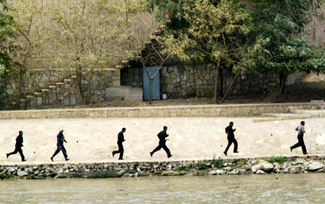| Home | Blog | Ask This | Showcase | Commentary | Comments | About Us | Contributors | Contact Us |

Why victory became defeat in IraqCOMMENTARY | March 89, 2007As long as there was an army to fight, the U.S. was unstoppable, writes a Harvard scholar who studies asymmetric conflicts. But once we lost the Iraqi people, all the power in the world wasn’t enough to achieve victory. (Second of two parts.) By Ivan Arreguín-Toft Why did the United States succeed so quickly in Afghanistan in 2002, yet fail so miserably in Iraq a year later? In Part 1, I suggested that the answer lies in the interaction of the strategies each side adopted. Here I unpack that argument a bit to explain why this is true. Anyone who has watched a contemporary sporting contest understands a core concept of strategic interaction: victory often hinges on the interaction of the strategies each team employs. For every ideal offensive strategy, there is an ideal defensive counterstrategy. The reverse is equally true, and it is just as true in military as in sporting contests. In fact, if we look at all asymmetric conflicts fought over the last two hundred years, in which a “weak” defender has employed an indirect defense against a “strong” attacker using a direct attack strategy, we get a striking result: weak actors are three times more likely to win. Figure 1: Strategic Interaction and Asymmetric Conflict Outcomes, 1800–2003
What has happened since WWII is that the United States has been using the same strategy – directly attacking its uniformed adversaries (where it can find them) – over and over, and those nominally weaker adversaries have adapted an ideal counterstrategy; essentially using strategy to overcome material weakness. The result has been that the United States’s overwhelming advantages in material power have only rarely been translated into victory. How then, did the United States and its Northern Alliance allies win so quickly in Afghanistan in 2002, when a little over a decade earlier, the Soviet Union had withdrawn its forces in defeat? The answer is that the ideal counterstrategy, indirect defense (of which guerrilla insurgency and terrorism are key variants), requires a high level of social support in order to work. No social support, no guerrilla warfare. From 1996, when the Taliban began the takeover of Afghanistan, it set about a series of religiously-inspired policies that increasingly antagonized and alienated most Afghans. By the time of the U.S. assault on Afghanistan in 2002, the Taliban had no social support inside Afghanistan. As a result, and unlike their mujahideen predecessors who fought the Soviets to a stalemate, the Taliban’s only real strategic option was a direct defense against the Northern Alliance. Skilled, well-led, acclimated, motivated, and now supported with an extraordinary array of massive and accurate firepower from the United States, Northern Alliance forces quickly destroyed the Taliban and the Taliban fled to Northwestern Pakistan (where they continue to enjoy strong social support). Each side followed a direct strategy – attempting to engage and destroy the other’s forces and capture its cities. So in that contest, the United States (and its local ally) won quickly. The same proved true in Iraq during Operation Iraqi Freedom. U.S. and British forces sliced through Iraqi conventional forces and rapidly converged on Iraq’s capital. Yet just as Napoleon discovered after capturing Moscow, and Lord Roberts after capturing the Boer capitals in South Africa eighty-eight years later, the capture of an enemy’s capital city only means victory if one’s adversaries agree. The Russians in 1812, the Boer in 1900, and nascent Iraqi insurgency in 2003 disagreed. Post-war environments are always tricky, but Iraq was a special case for the United States because for over a decade it had been saying it acted in the best interests of something called the “Iraqi people,” yet visibly acting in its own interests. After the collapse of Iraq’s conventional defense in April of 2003, the United States again claimed it had and would act in the best interests of Iraq’s people. They may therefore be forgiven for skepticism. Following a series of colossal blunders by the Coalition Provisional Authority, which for Iraq’s people only underlined the fact that whether interested or not, the United States had no capacity to provide for even the most basic needs of the Iraqi people, the United States came to face a classic insurgency. At the insistence of then-Defense Secretary Donald Rumsfeld, the United States initially attempted to use its tiny, high-tech conventional military to counter that insurgency (all the while denying that it in fact faced an insurgency). As in most asymmetric conflicts in which the weak actor switches to an indirect defense, this effort by the strong actor failed, and in failing the United States continued to give Iraqis fresh causes to resist their well-intentioned occupation. Rumsfeld was correct in his argument that a “revolution in military affairs” made small, high-tech forces lethal when matched against conventional forces defending territory or cities; but dead wrong in his assumption that they could be equally effective in occupation or counterinsurgency operations. Now it is far beyond too late to salvage a unified democratic Iraq friendly to U.S. interests. In General David Petraeus, the United States has perhaps its best commander facing an existentially impossible mission. And if past asymmetric conflicts of this type are a guide, the best Petraeus can hope to achieve is space for the United States to withdraw its forces in a face-saving way, while an unstable Iraq soon disintegrates into three unstable Iraqs: one Sunni, one, Shiite, and one Kurd.
|
||||||||||||





